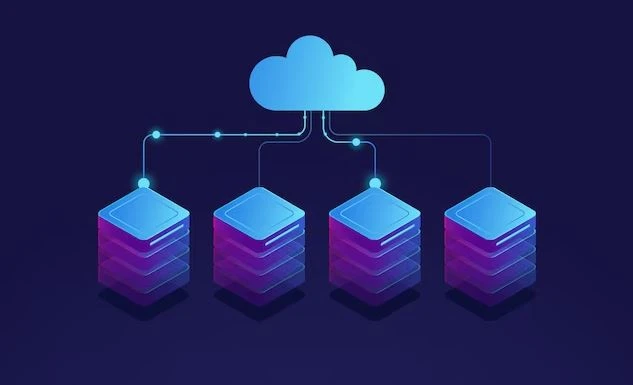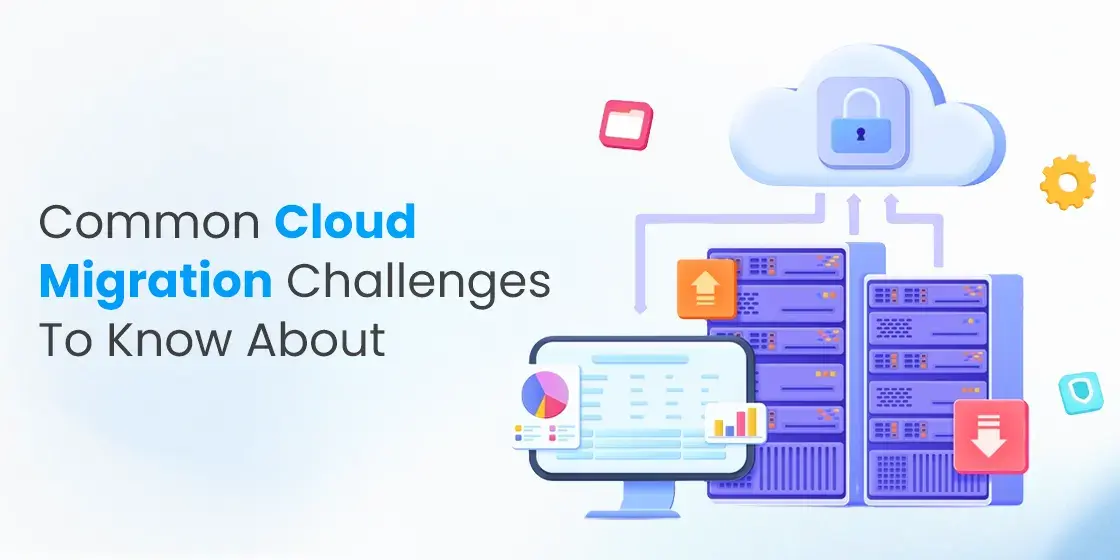Table of Content
Common Cloud Migration Challenges IT Engineers Usually Face
The evolution of cloud technology has taken the tech world by storm. Every company is looking to shift its infrastructure on cloud, as it provides better operational benefits blended with advanced features. However, shifting an existing infrastructure to the cloud is not an easy job. It requires in-depth knowledge about migration, as well as understanding of cloud compatibility. These cloud migration challenges cannot be handled by any random team, which is why it is always advised to take professional software outsourcing services to deal with these challenges. It ensures to get top-notch migration solutions without disrupting the operations of the existing tech infrastructure.
A lot of times, people commit various types of mistakes while migrating their business services to the cloud. It is certainly not an easy process because multiple complexities are involved in it. A little mistake can derail the whole process, and can take all the hard efforts into vain. That is why proper knowledge and understanding is required to deal with cloud migration challenges. If you won’t follow the basic migration principles, then things can go out of hand, creating difficulties for the whole process.
While migration is itself a hard task, keeping different other interconnected factors in mind also becomes a tough responsibility for the designated teams. It includes challenges of data security, application performance, network bandwidth, and more other similar things. So, cloud migration should be handled with utmost precision, and its respective teams should be given appropriate resources. They need to know which cloud migration challenges they will be taking on during the whole process. In this blog, we will discuss these problems in detail, so that people can understand how complex this whole job is. We will also discuss different ways to mitigate these challenges, hence it will be a good read for the cloud tech enthusiasts.
But before moving into that, let us first discuss the rising importance of cloud technology, as why its demand is increasing and how it is streamlining different work processes for businesses.
Importance of Cloud Technology

Cloud technology has created a huge impact in the tech world. It has offered a new way to streamline things and execute operations with better accuracy. The good thing about cloud technology is that it is not just associated with the IT industry, but has got huge implications for the other sectors as well. From healthcare to banking, cloud technology is becoming important everywhere. It offers a fresh perspective to execute and manage tasks without requiring any physical infrastructure. It is a big plus for many companies, especially for those that cannot afford to deploy advanced tech infrastructure physically.
With the help of cloud based smart building technology, companies can store all the data to a secure location. This is one of the core reasons why cloud technology is preferred by many organizations. They understand the importance of data security, and how cloud servers can help them to work with this problem. Besides that, cloud technology also helps to speed up the pace of different processes. It automates various functions that give ease to the administrators to manage different tasks effectively.
These are all the major reasons why the popularity of cloud technology is quickly gaining momentum in the tech world. It is enforcing every company to move towards cloud technology, so that better automation can be achieved in the management of different processes. The migration towards cloud is however a one area where companies often struggle, hence this process should be dealt with proper technical knowledge.
Common Cloud Migration Challenges

When migrating business services to the cloud, companies face various types of challenges. These problems often become bigger if they are not dealt with proper technical knowledge. Below, we have highlighted some of the common cloud migration challenges that companies usually face during transition. Let’s take a look at them in detail.
Lengthy Migration Process
The process of migrating to the cloud is a complex and time-consuming endeavor. Typically, this migration unfolds in several sequential stages, with comprehensive testing and validation conducted between each step. It requires complete focus and attention during the overall process, so that chances of errors can be reduced to the full.
The efficiency and seamlessness of the cloud migration are contingent upon the quality and thoroughness of the devised cloud migration strategy. In instances where a strategy is either absent or unclear, considerable time may be expended in deciphering the process on the go. Moreover, there is a risk of tasks needing to be revisited multiple times to ensure correctness.
As the duration of the cloud migration process extends, so does its financial and operational impact on the organization. In the intermediate phases of migration, there is a simultaneous financial burden incurred by the organization, as it is required to cover the costs of both on-premises and cloud infrastructure. This dual expenditure contributes to an escalation in overall expenses during the migration period.
Hefty Migration Cost
Cloud services often come with a substantial price tag. Surprisingly, for organizations seeking to transition to the cloud with the aim of reducing IT infrastructure costs, it might be discovered that cloud services are, in certain cases, more expensive than maintaining an on-premises data center. The occurrence of financial shock during or post-cloud migration frequently stems from insufficient research and planning.
When an organization lacks a comprehensive understanding of its software development environment and its usage patterns, the utilization of cloud services, along with their associated costs, may surpass initial expectations. Similarly, inadequate research into a chosen cloud provider and its policies can lead to unanticipated charges or fees.
Thorough planning is crucial to gaining visibility into and mitigating some of the potential cost challenges associated with the cloud. A clear comprehension of an organization’s IT solutions and their specific functional requirements enables better predictions of cloud consumption. Furthermore, a profound understanding of a business’s cloud needs, coupled with a deep knowledge of what various providers offer, facilitates the optimization of cloud infrastructure and the reduction of overall cloud-related expenses.
Dealing with Existing Architecture
Cloud migration encompasses the transfer of data storage and applications from on-premises environments to cloud-based infrastructure. This process is typically carried out incrementally, with each stage carefully validated to ensure successful completion before advancing to the next phase. If any mistake is made during one of the core phases, the whole process can be derailed very easily. This is why it is recommended to engage expert professionals in the migration process, as they know the nitty gritty of every technical function.
When an organization possesses a sophisticated existing IT architecture, the formulation and execution of a cloud migration strategy can be challenging. The complexity of the current architecture may necessitate the collocation of specific systems to maintain high-quality service delivery. Furthermore, the intricacies of the architecture can pose challenges in identifying and documenting interdependencies. Developing a phased strategy for the migration of specific components or systems to the cloud becomes intricate in such scenarios.
Lack of Technical Resources
The challenge of cloud migration becomes particularly pronounced when an organization is faced with a shortage of technical resources. Firstly, the planning phase becomes intricate as there may not be enough skilled personnel to comprehensively assess the existing IT architecture and formulate a robust migration strategy. Adequate research, analysis, and strategic planning are vital for a successful transition to the cloud, and the absence of technical expertise can hinder the ability to identify critical dependencies.
Secondly, the actual execution of the migration process is impeded by a shortage of technical resources. Without a sufficient number of skilled professionals, the organization may struggle to perform the necessary tasks such as configuring cloud environments, adapting applications, and ensuring data integrity during the migration.
Lastly, ongoing maintenance and optimization of the cloud infrastructure post-migration become challenging when technical resources are limited. Continuous monitoring, troubleshooting, and refining the cloud environment are essential for ensuring optimal performance and cost-effectiveness. The shortage of technical expertise may result in slower response times to issues, hinder the implementation of best practices, and limit the organization’s ability to leverage advanced cloud features that could enhance operational efficiency.
Core Benefits of Cloud Migration

Now that we have understood the common challenges associated with cloud migration, let’s take a look at the advantages of this process. It is indeed a very beneficial thing that allows companies to automate and manage various types of functions easily. Though the process is itself a little difficult, but also offers plenty of good things in return. Let’s take a quick look at them below.
Security
When implemented effectively, the cloud can provide a level of security surpassing that of traditional network systems. The cloud encompasses systems, networks, and applications that require secure configuration and maintenance, guided by the “shared responsibility” model. In this model, users are accountable for securing their portion of the cloud. Notably, leading companies like Amazon adhere to this secure software development framework, building their cloud services with security as the foremost criterion from the ground up. This proactive design, emphasizing privacy and security, distinguishes cloud offerings from conventional networks.
By consolidating business information and data in a centralized manner, the cloud delivers superior security compared to traditional data centers. Most reputable cloud providers integrate numerous built-in security features, including security analytics, regular updates, and cross-enterprise visibility. These providers address challenging security issues, such as preventing unauthorized access to machines housing business data and applications and implementing automatic security updates to guard against the latest known security threats.
Operational Cost
Operational cost is yet another a factor that makes cloud migration an essential thing for organization. It is often touted to be the biggest benefit that enforces companies to move towards cloud. We all know pretty well that many small businesses in the market cannot afford to set up expensive data centers at the offices. Their lack of budget often rules out this possibility, as they don’t start their business with hefty resources.
This is where cloud technology becomes extremely beneficial, as it allows them to work with an advanced infrastructure without physical owning them by spending any big budget. According to a recent survey conducted by Microsoft Office 365, it has been revealed that 86% of SMBs reported dramatic reduction in operational cost after migrating their business to the cloud. This is one of those things that is loved by almost every company, as it gives them a room to spend budget on other important areas.
Industry Compliance
Cloud companies offer specialized services adhering to the compliance rules of the industry. This makes cloud migration easy for different sectors including banking, medical, IT and more others. Earlier, there were different challenges present that were hindering companies in the migration process. Due to this, many stakeholders remained reluctant in taking their businesses to the cloud. However, with the arrival of new technologies and platforms like Microsoft Azure, AWS and more others, things have become completely streamlined.
For example, Microsoft Azure comes up with a plethora of auditing capabilities that allows businesses to easily see the mode of data access across the company. This is how administrators can keep a track of every access that too without engaging in any manual activity. Similarly, AWS is also accredited with different compliance certification levels like HIPAA, SO27001, and AICPA/SOC. These certifications make AWS a reliable platform where businesses can easily host their data round the clock.
Data Backup
It is a well understood fact that data is the most important thing for any organization. No one can afford to compromise data in case of any incident, as it holds the key to drive a company in the market. With cloud technology, this safety and security of data becomes completely streamlined, as the technology provides advanced mechanisms to manage data as per the best industry standards. This is why many enterprises are preferring to keep their data on cloud these days, because they know how secured and steadfast is infrastructure is.
The good thing about this feature is that data backup comes free of cost with most of the cloud services. It is a double plus for many startups that are not financially stable. The cloud services enable them to work with freedom without thinking anything about data security or privacy.
Final Words
That takes us to the end of this blog in which we have discussed about different types of cloud migration challenges in detail. It is very important to know that cloud migration is not an easy process, as it involves different types of difficulties at various stages. If you do not know the basics of migration or integration in cloud, then you will struggle a lot. This blog is therefore written to let you know about different cloud migration challenges, as well as how to mitigate them using precised solutions. It will clear your basics, and will let you know how to deal with different problems while migrating any application to the cloud.
Meanwhile, if you are looking for a company that offers top-notch cloud integration and migration services, get in touch with us today. We have got plenty of experience in this field, and our experts can help you to migrate any application to the cloud by following a seamless process.
Empower your digital initiatives with BariTechSol, a premier custom software development company. Our skilled team tailors cutting-edge solutions to your unique needs. Elevate your tech experience and stay ahead in the digital realm. Partner with BaritechSol and code the success of your next big idea.


